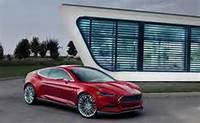Ford and AIA Join Forces to Explore Overlapping Worlds of Automotive and Architectural Design
 |
SAN FRANCISCO--April 11, 2013:
- "Design with a Conscience" panel brings together leading architects, innovators and automotive designers to push the boundaries of sustainable design
- Ford is collaborating with the American Institute of Architects (AIA) San Francisco Chapter to discuss common design trends between cars and buildings
- Vehicles and buildings are increasingly expected to be stylish, sustainable and affordable
Sleekly fashioned from steel and glass and carefully designed from sustainable materials, today's buildings are judged on exterior aesthetics as much as interior function. They have much in common, then, with today's automobiles, designed to be sustainable, efficient high-tech works of art.
Ford Motor Company today joins the American Institute of Architects (AIA) San Francisco Chapter to discuss how the two industries are moving in parallel, interpreting similar trends and learning from each other.
"Design with a Conscience," a luncheon panel hosted by Ford and AIA San Francisco, features automotive design experts and San Francisco-based architects and innovators who will discuss how societal trends inspire and influence both the architectural and automotive industries.
"As a car designer, our goal is to create a car that has a timeless style and yet operates functionally the way the customer needs it to," said Freeman Thomas, director, Strategic Design, Ford Motor Company. "A car is more than just a pragmatic choice, and it's the design that makes a difference, creating an emotional connection with the customer."
Whether a building or a car, the emotional connection customers feel comes from an instantaneous, positive response to the design along with a sense of responsibility, Thomas said.
"Consumers want more than something that just looks good – they also want to feel like they are doing the right thing when they make a purchase," he said. "The Ford Fusion Energi is a testament to that, combining unprecedented style with an outstanding sustainable resume."
The sleek new 2013 Fusion Energi plug-in hybrid boasts EPA-estimated fuel economy of up to 100 MPGe combined, 21 miles of all-electric range and 620 miles of overall range -- which means it can cruise the West Coast's scenic Highway 101 from Sacramento to San Diego on one tank of gas and one full charge.
Architects and auto designers face similar challenges in creating something with the longevity modern customers expect.
"Buildings are designed for an average 73-year lifespan, and with today's technologies they can have an afterlife well beyond that through recycling and adaptive reuse," said architect Allison Williams, who will moderate the panel. "Architecture must stand this test of time, and be of its time."
Good building design is not about making a futuristic statement as much as it is about taking clear responsibility for the future of the environment and addressing social, economic and cultural issues -- in public buildings and places in particular, Williams explained.
"The successful outcome, not unlike an automobile, will always be a clear design, ideally with incrementally transformative technology," she said. "It will evoke desire and meaning, will provide comfort, identity or pride for its users/consumers, and will demonstrate responsibility through the statement its aesthetic makes."
Data show building and car designs increasingly focus on materials that are robust and environmentally friendly, without having to compromise on style.
Architects face the same challenge as car designers: Design a product for conscientious buyers, who want to know they are getting what they want but also are doing the right thing. With new options like LEED certification, solar power or geothermal heating, architects are getting creative and incorporating new practices to give buyers an alternative.
Similarly, Ford has a long-standing and growing commitment to sustainability -- about 85 percent of the materials used in Ford vehicles are recyclable.
Additionally, Ford gives consumers the power to choose a fuel-efficient vehicle that fits their needs. Ford's lineup includes eight vehicles that are EPA-certified to deliver at least 40 mpg.
The panel discussion can be followed live at Design with a Conscience
Panel participants include:
- Allison Williams, FAIA, moderator
- Anne Fougeron, FAIA, principal of Fougeron Architecture, speaker
- Ann Hand, CEO of Project Frog, speaker
- Freeman Thomas, director, Strategic Design, Ford Motor Company, speaker


